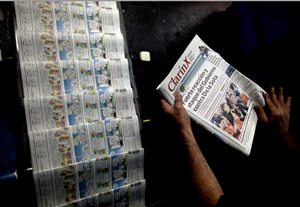Argentina’s Clarin Wins Extension on Monopoly Deadline

Argentine media group Clarin has won an extension on the time it has to sell off assets in line with an anti-monopoly media law, in a victory for the company and defeat for the Kirchner government.
The company had been given until December 7 to hand in a plan to reduce its holdings, including many of its cable assets, in order to comply with a 2009 law. Hours before the deadline, the Civil and Commercial Appeals Court ruled that the company did not have to act until a review of the media law was complete, reports Reuters.
In May, Clarin obtained an injunction against the media law, which was due to expire today. It has now been extended until a lower court rules on whether the law is constitutional. The Financial Times called the ruling an “11th hour reprieve.”
Government allies reacted angrily, criticizing the appeals court for holding up implementation of the media law, and said they would appeal to the Supreme Court. Martin Sabbatella, head of the AFSCA, the body in charge of implementing the law, threatening to have the appeal court judges disqualified, accusing them of being biased and accepting a Clarin-paid trip to Miami, reports the Financial Times. He said that the ruling was a disgrace, and hurt democracy.
The administration of President Cristina Kirchner is putting “tremendous pressure” on the judicial system over the case, according to the Wall Street Journal, with officials warning that granting extension of the injunction would be an “insurrection.”
Both sides accuse the other of acting in bad faith. Clarin has accused the government of trying to silence opposition voices through applying the law, while the government has claimed that its motive is to democratize Argentina’s media and prevent one company being too dominant. As the WSJ points out, Clarin had been widely viewed as “a heavyweight that either pandered to governments or bullied them to get what it wanted.”
Clarin enjoyed a warm relationship with the Kirchner faction until its coverage of farmers’ protests in 2008, and was allowed to carry out a controversial merger under the president’s late husband, then-President Nestor Kirchner, despite anti-trust regulators ruling against it.
The Center for Economic and Political Research (CEPR) comments that there is reason to believe the government’s line that the media law is indeed about “democratizing a media landscape dominated by heavily-monopolized media conglomerates that are often opposed to the forces of change under way in the country.” It notes that Frank La Rue, the Special Rapporteur for Freedom of the Expression for the UN, has described the law as “a model for the continent and other regions of the world.”
The Committee to Protect Journalists criticized Clarin’s move to launch a complaint against pro-government journalists, and commented that “it is clear what is at stake in a power struggle where freedom and processes of democratization are just part of a rhetorical strategy.”
The law sets allows a maximum of 24 cable licenses, and Clarin has 237. The company currently controls 42.8 percent of the radio market, 38 percent of open TV and 59 percent of cable TV, as BBC Mundo sets out. There are another 20 companies that also have to divest themselves of assets, according to the AFSCA.
Whatever the motives of the law, the debate has now moved into new territory. For the WSJ:
The outcome of the showdown, once seen as a political grudge match between the populist president and a media giant with a controversial past, seems likely to shape press freedom for years to come, and become a key test of legitimacy for the country’s courts.
Please accept this article as a free contribution from COHA, but if re-posting, please afford authorial and institutional attribution. Exclusive rights can be negotiated.

